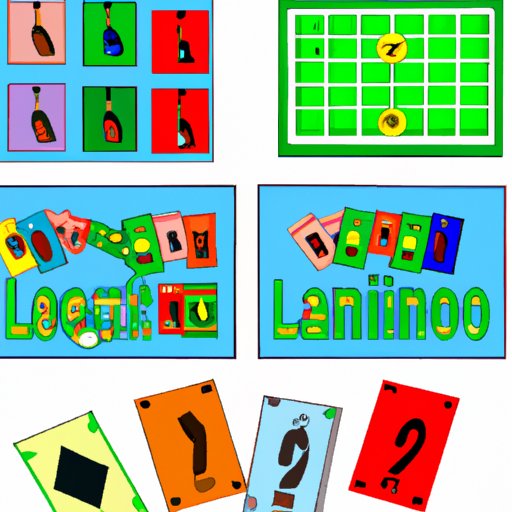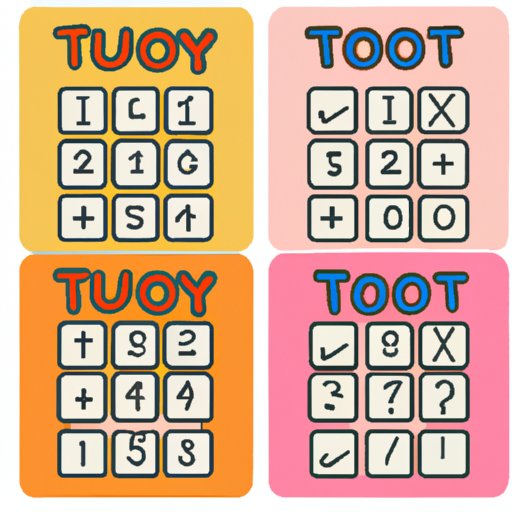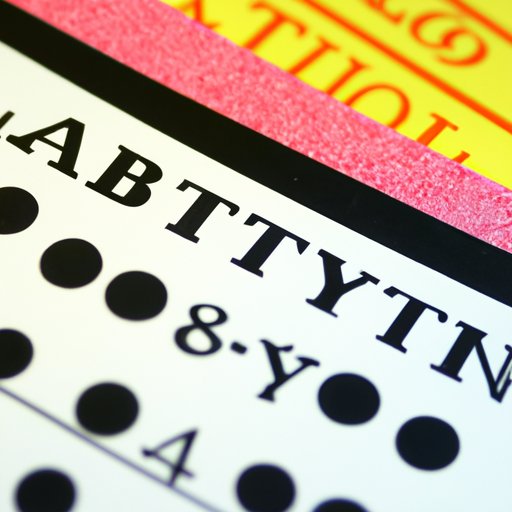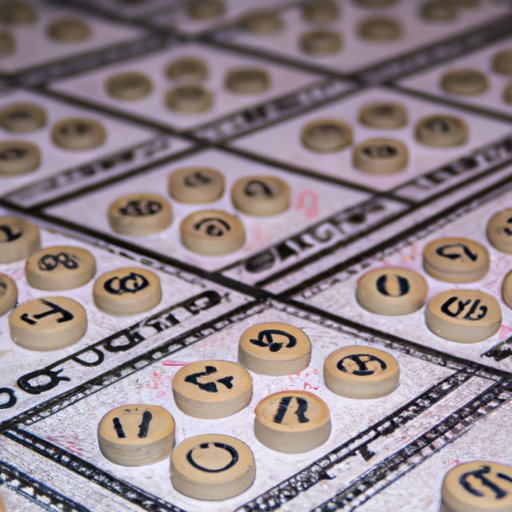Introduction
The lottery has been around for centuries, with some evidence suggesting it was first introduced in ancient China about 2000 BCE. Today, lotteries are played around the world, with many countries hosting their own national lotteries. But what is a lottery and how does it work? This article will explore the different types of lottery games, the odds of winning each type, the legalities of playing the lottery, its history, and its impact on society.

A. Definition of the Lottery
According to the Cambridge Dictionary, the definition of a lottery is “a game of chance in which people buy numbered tickets, and a prize is given to the person who holds the ticket with the correct number or numbers.” In other words, the lottery is a form of gambling where players purchase tickets with a predetermined set of numbers. If those numbers match the randomly drawn numbers, they win a cash prize.
B. Overview of Different Types of Lottery Games
Lottery games come in a variety of forms, from scratch-off tickets to draw lotteries. Let’s take a look at the different types of lottery games and how they work.

I. Types of Lottery Games
A. Overview of Lottery Game Mechanics
No matter which type of lottery game you play, the mechanics are essentially the same. Players purchase a ticket that contains a set of numbers, or symbols, and if those numbers, or symbols, match the randomly drawn numbers or symbols, they win a prize. The amount of the prize varies depending on the game and the number of winners.
B. Exploring Scratch-Off Tickets and Other Instant Lottery Games
Scratch-off tickets are one of the most popular types of lottery games. To play, players purchase a ticket and then scratch off the covering to reveal the numbers, or symbols, underneath. If the revealed numbers, or symbols, match the pre-determined winning combination, the player wins the prize. Other instant lottery games include keno and bingo, where players pick a certain number of numbers, marks them off on a card, and if all the numbers are marked off, they win.
C. Examining Draw Lotteries, Such as Powerball
Draw lotteries, such as Powerball, are another popular type of lottery game. To play, players purchase a ticket and select a set of numbers. Then, a drawing is held and if the player’s numbers match the randomly selected numbers, they win a prize. The size of the prize depends on the number of matches and the number of winners.

II. Odds of Winning Different Lotteries
A. Calculating the Odds of Winning Each Type of Lottery
The odds of winning any lottery game depend on the type of game and the number of players. For example, the odds of winning a scratch-off game are much lower than the odds of winning a draw lottery because there are fewer players and fewer prizes in a scratch-off game. According to the National Council on Problem Gambling, the odds of winning a Powerball jackpot are 1 in 292 million.
B. Investigating Strategies to Increase Your Chances of Winning
Although the odds of winning any lottery game are slim, there are strategies you can use to increase your chances. For example, if you’re playing a draw lottery, like Powerball, you can purchase multiple tickets with different sets of numbers. This increases your chances of matching the winning numbers. You can also join a lottery pool with friends or co-workers, which increases the number of tickets purchased and thus increases your chances of winning.

III. Legalities of Playing the Lottery
A. Examining Legalities of Playing the Lottery in Various Countries
The legalities of playing the lottery vary from country to country. In some countries, such as the United States and Canada, lotteries are legal and regulated by the government. In other countries, such as India and China, lotteries are illegal. It’s important to check the laws in your country before playing the lottery.
B. Looking at Any Restrictions on Playing the Lottery
In countries where the lottery is legal, there may be restrictions on who can play. For example, in the United States, anyone over the age of 18 can play the lottery. However, in some states, such as Alabama and Arizona, the minimum age is 19. It’s important to check the rules and regulations in your state or country before playing the lottery.
IV. History of the Lottery
A. Exploring the Origins of the Lottery
The origins of the lottery go back centuries. Some historians believe it was first used in ancient China about 2000 BCE. Others believe it originated in Europe during the Roman Empire. Over time, lotteries spread throughout the world and became a popular way for governments to raise money for various causes.
B. Looking at How the Lottery Has Evolved Over Time
Over the years, the lottery has evolved in many ways. For example, in the United States, lotteries were originally only available in certain states, but now they are available in every state. Lottery games have also become more sophisticated, with the introduction of new games and technology, such as online lotteries.
V. Impact of the Lottery on Society
A. Discussing the Economic Impact of the Lottery
The lottery has had a significant economic impact on society. According to a study by the World Bank, lotteries have generated billions of dollars in revenue for governments around the world. This revenue has been used to fund public projects, such as schools and infrastructure, as well as charitable causes, such as scholarships and health care.
B. Examining the Social Implications of the Lottery
The lottery has also had a social impact on society. According to a study by the University of California, Berkeley, lotteries have been linked to increased rates of problem gambling. Additionally, lotteries have been criticized for targeting low-income communities and relying on people’s hopes and dreams to generate revenue.
Conclusion
The lottery has been around for centuries and is a popular form of gambling around the world. This article explored the different types of lottery games, the odds of winning each type, the legalities of playing the lottery, its history, and its impact on society. From scratch-off tickets to draw lotteries, the lottery is an exciting way to try your luck and potentially win big.
of the Article
This article explored how does the lottery work by examining its different types of games, odds of winning, legalities, history, and impact on society. It discussed the mechanics of each type of lottery game, the odds of winning each type, the legalities of playing the lottery, its origins, and its economic and social implications.
B. Final Thoughts on the Lottery
The lottery is an exciting way to try your luck and potentially win big. However, it’s important to remember that the odds of winning are always slim and to play responsibly.
(Note: Is this article not meeting your expectations? Do you have knowledge or insights to share? Unlock new opportunities and expand your reach by joining our authors team. Click Registration to join us and share your expertise with our readers.)
